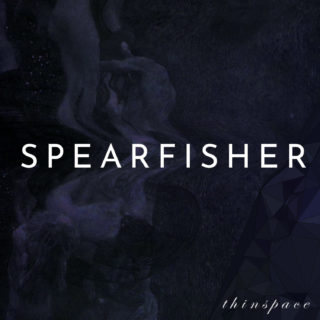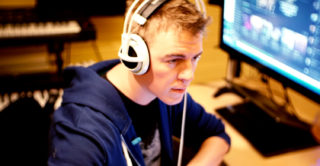
Synthesist and composer Peter John, aka Spearfisher, let us know about his new album, thinspace, that is a sort of soundtrack to the sci-fi novel of the same name.
The novel, by author Jeremy John, explores a dystopian future, where neuroscience and memory manipulation are used to shape our personalities to service the needs of an AI’s economic machine.
The album features ‘tons of crazy futuristic synth textures’, created with a Roland Juno, an Oberheim Xpander; inspiration from foley artists to classical composers; and the cello of classical performer Cicely Parnas.
We asked Spearfisher to tell us more about the project:
“Jeremy John is my brother, 2 years older. He’d started a draft of this book many years ago and it was a story that really stuck with me – creative, visionary and deep. As he decided to turn these ideas into a novel, he would bounce ideas off of me for hours as he developed the world.

Eventually, he asked me to collaborate and create a sort of “score” for the book, which came with many challenges! One of the biggest is the challenge of time – a book takes many many hours to read whereas music can only be truly listened to in a sustained way for around an hour or so. Also, I wanted the album to stand on its own completely musically and to tell this story of a kid growing up in a crazy world and eventually breaking himself to break free without the text at all.
So, I decided not to create long atmospheric textures, but to rather use each chapter as a musical locus and tell this story in a way which makes sense musically.”
He also told us about the process and musical thinking behind the new album:
“I’ve used ideas from the world of foley and found sound, like the first track, Entering the Thickspace.
In the book, Isaac is travelling from the ‘Thinspace’ (a world outside of the City’s mesh network) into the ‘Thickspace’. As he comes to this barrier, the cultural mind floods his brain with dopamine and a rush of pleasure.
I used a recording I made in the country with a M/S mic of a car coming down the road, then digitally altered/enhanced it with my Roland Juno 106 in the Prelude in order to give the feeling arriving into an orgasmic future city.

Working closely with concert cellist Cicely Parnas was central to creating this album. She is a classical cellist who performs all over the world (Carnegie Hall, Lincoln Center, Kennedy Center) with rave reviews from Washington Post, New York Times and more; so it was an honor to recorded her playing on her 1812 Granchino cello.
I would often dictate music to her in real time and record, re-record and loop her playing to create dense webs of cello textures. You can hear this technique on Sol’s Dream, where the entire song comes from the first 10 notes on the cello.
I’ve used the sound of the Cello to represent Isaac and Sol’s humanity and given them distinctive musical themes to depict the characters with leitmotifs — for instance Isaac’s theme (the main character) is played at the top of Isaac is tripping, the beginning of the album and hidden all throughout the story. In the track Isaac is Tripping, we hear this theme on the cello is deconstructed after he takes acid to break free from the world of the mind, eventually losing the thread of the melody throughout the next track as animal roars and hallucinations become more real than Isaacs own humanity (the Cello).
Finally in the Epilogue, we hear a new theme played by the Cello (representing the human) and eventually becoming destroyed by a massive crushing sound (which is actually a granular destruction of the first track of the album). A massive synth (a crazy Serum patch I made) repeats the theme we just heard, musically showing Isaac as becoming totally inhuman and fully machine, showing this theme to be totally broken.
This is how the book ends, with Isaacs choice to take acid and free himself from the mind in turn forces him to delete 16 years of his memory, forgetting his entire life and losing his own mind.”
You can preview thinspace below:
thinspace is available now as a digital download via the Spearfisher site. For details on the novel, see author Jeremiah John’s site.

Yaaay! Thanks for sharing Synthtopia! Ask any questions in the comments and I’ll answer em!
This is a very cool project. Also love the cello, just adding one express of instrument, whether electronically or acoustic, takes things to the next level.
Did you and the cellist do some live jam videos previously? It seems like I remember seeing something like that or year or so ago!
Hi AnalOG – yes we did do a looping/jam video a while back that got put up here by the good ppl at synthtopia! I also did a review of the Alesis samplepad a while back when it came out – have been working on this album and a bunch of other projects (using kinect with a Ballet group here in MN, sampling+performing with choirs/sample synthesizers and teaching classical piano!)
check out my album page @ http://www.sprfshr.com/thinspace/ to see more about this project
Cool stuff! Good to hear something that’s actually creative and different.
Thanks Ed! Appreciate it!
This sort of concept album cries out for old school vinyl with a gatefold cover, so you can stare at the sci if art and take a musical trip.
I’m sure more than a few of the synthesists that read this site did that back in the 70’s! I used to love how the art on TD and Klaus Schulze albums went so well with the music.
Definitely! Was trying to convince my brother to do a Kickstarter with a vinyl with art and book release (rather than waiit another year on a traditional publisher…) But if we get some interest in the project would love to do it!
Wow…seriously nice work. I like the balance: the organic touch of the cello contrasted with the colder, more synchronized feeling synths. If the book is as stirring, you BOTH might get a movie deal out of it… : )
Cheers!
Thanks for listening! Would be great to get a movie deal, if they come calling we’re ready and waiting!!
?
Enjoyed reading about this and also the recent article about the guy who scored a movie with his iPad.
The chance of anyone getting ‘discovered’ Is pretty slim anymore, so I think musicians have to make things happen themselves. These two guys are definitely doing that!
Yeah things are very different than they were 10 years ago, both good and bad. Love having the cost of equipt went and software affordable but it makes the market really crowded. Thanks for checking it out, I’ll look for the guy who made a soundtrack with his iPad, sounds cool!